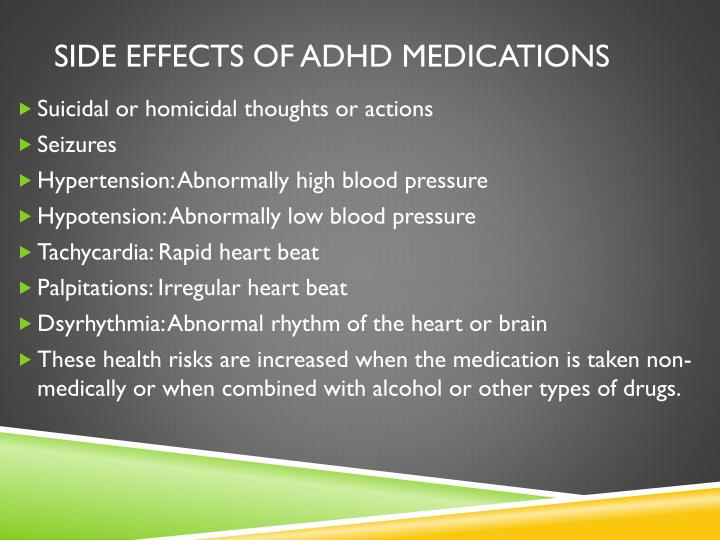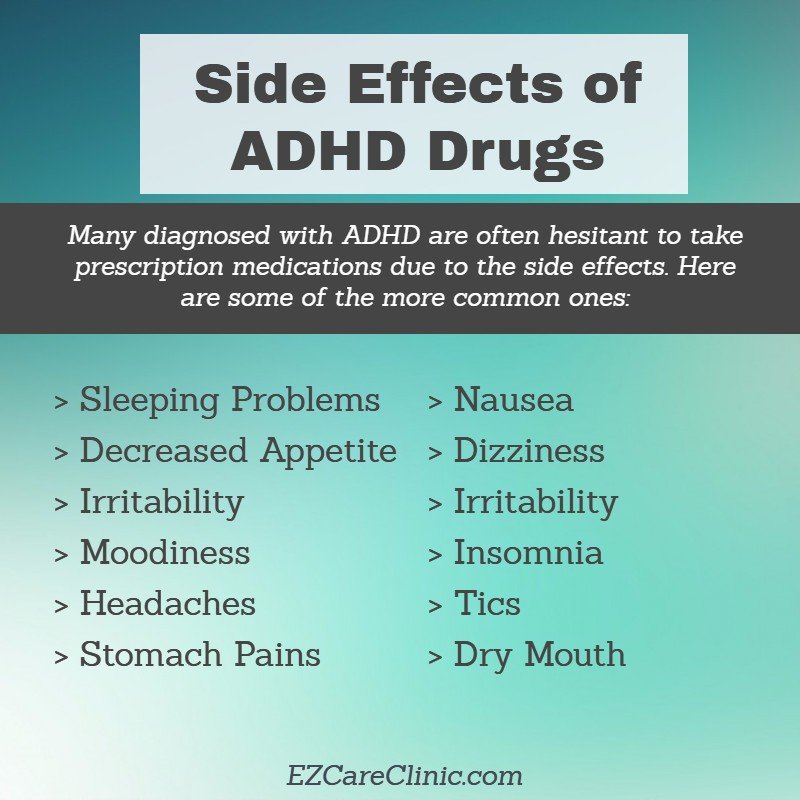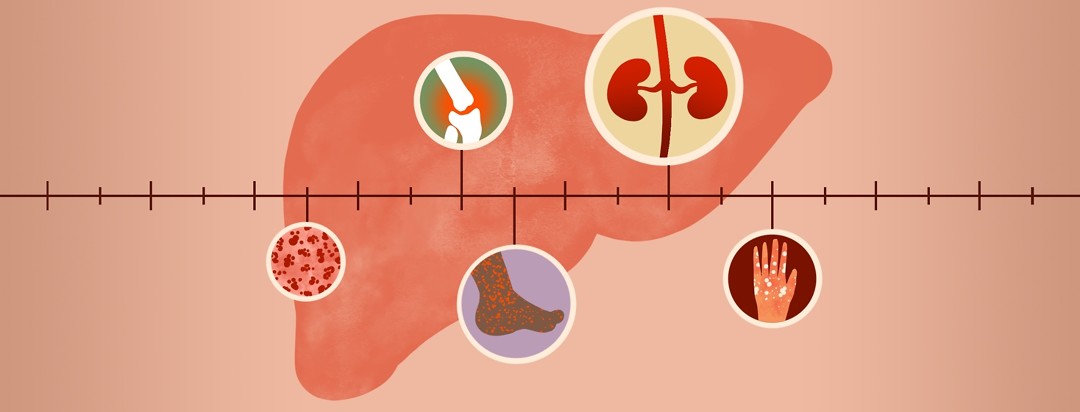Like all medications, stimulants may produce side effects. However, it’s important to know the potential side effects of any drug that affects your brain’s chemical communications.

PPT Negative Effects of Using Adhd medications non
These medications sometimes can also be used for people who suffer from sleep attacks (narcolepsy), chronic fatigue and to boost antidepressant effects.

Adhd medications and side effects. Adhd medications can cause these side effects. Medications are given to adhd sufferers to increase their ability to pay attention, manage their impulsiveness and hyperactivity. They do not work as quickly as stimulants, but their effect can last up to 24 hours.
More common adhd medication side effects such as appetite loss, headaches, sleep issues, and moodiness are usually mild and nothing to worry about. It is often not a cause for concern in most children but should be used with caution if the child has congenital heart disease or some underlying heart conditions. Other side effects of stimulant medications for adhd.
Insomnia, dizziness, and restlessness are also common. Effect on the developing brain. Amphetamines and methylphenidates increase the levels of the neurotransmitters, dopamine, and norepinephrine in the brain.
There is also some danger of liver damage from medications used to treat add and side effects. Adhd is a developmental condition that affects concentration and attention. Many different medications can reduce adhd symptoms, each of which has a.
Parents and teachers need to be aware of potential side effects and know how to manage them. These medicines help ease tics, a side effect of taking stimulant adhd medication types for adhd treatment. Besides suppressing a person’s growth, add medications can also cause an individual to experience all sorts of other unwanted side effects, including:
But in north america, a large portion of the pediatric population is being screened and diagnosed with adhd every day. That means doctors can prescribe them even though they haven’t been approved by the fda for use with adhd, side effects often include trouble sleeping, nausea, constipation, dry mouth, sweating, and changes in sex drive. Stimulants are associated with an increase in blood pressure and heart rate.
Parents usually worry about medication side effects. Types of antidepressant adhd medications and side effects. Adhd medication side effects in children include decreased appetite, headache, anxiety, nausea, dizziness, vomiting and abdominal pain.
Stimulant drugs used for adhd include various amphetamines and methylphenidates. Attention deficit hyperactivity disorder (adhd) is often treated with the use of stimulant medications like ritalin, concerta, adderall, and vyvanse. Adhd medications can generally be split into two categories:
This article is based on reporting that features expert sources. These drugs can help to increase focus and alertness in people with attention problems. The goal of adhd treatment with stimulant medications is to find a medication that is both effective and has no (or minimal) side effects.
Adhd medications are a common way to help people go about their daily lives. Worry about the dangers of taking these adhd drugs for extended periods. But it can sometimes cause side effects.
One of the side effects of ritalin is that it boosts the activity of the heart and the cardiovascular systems so that they develop beyond what is considered normal. Medications for adhd have side effects as they target neurotransmitters. The right adhd medication can make life much easier for children and adults who have attention deficit hyperactivity disorder (adhd or add).
Sometimes it takes a couple of different medication trials before finding the best treatment. 1 people with adhd may have more problems controlling their impulses, and they may seem hyperactive (being unusually active). Stimulant medication safety concerns beyond the potential side effects, there are a number of safety concerns associated with the use of stimulant medications for adhd.
Adhd medications and side effects. While there are differences in culture and diet, could there be. Side effects of adhd medications.
In many parts of the world, attention deficit hyperactivity disorder (adhd) is not a common diagnosis. Adhd medication can be an effective way to reduce symptoms of adhd (also known as add) in kids. This is a very legitimate concern, but must be balanced with the risks of not treating.
Medication is used to help manage these symptoms effectively, but they can come with side effects. Stimulating medications also affect the cardiovascular system. Other side effects include weight loss, anorexia and pruritus ( itching ).
Medications can cause decreased appetite, moodiness and stomach aches. Nonstimulants were approved for the treatment of adhd in 2003. If a child has side effects to one stimulant, they can usually do well on a different class (methylphenidate vs amphetamine).
Compare and contrast the various types. Overall the medicines listed above are very well tolerated. Atomoxetine prolongs the action of norepinephrine in the brain.
Having adhd can make it hard to focus, plan, and pay attention. But adhd medications can also make things worse and cause severe side effects, including headaches, sleep problems, and a blunted appetite.
The following tips will help you manage some of the more common side effects of hepatitis c treatment: Disturbed sleep (insomnia) what about patients with hepatitis c who also have hepatitis b?

What Are Extrahepatic Manifestations?
The most important factors that impact treatment results include:

Hep c medications side effects. 76 rows drugs used to treat hepatitis c the following list of medications are in some way. People who have chronic hepatitis c need medication to treat it. Confusion, drowsiness and slurred speech (hepatic encephalopathy) spiderlike blood vessels on your skin (spider angiomas) every chronic hepatitis c infection starts with an acute phase.
One common one is vitiligo, a condition that causes loss of color on the face. If the person also takes ribavirin, side effects include. It reduces liver inflammation and can help reverse fibrosis and even cirrhosis.
Slow the advancement of inflammation and scarring of your liver; Depression is a common side effect. Side effects of hep c protease inhibitors are.
The hep c medication side effects you might experience as you might expect, different drugs have different side effects. Side effects of hep c medications. Daas don’t cause the number of side effects that interferons do.
Fatigue, low blood cell counts (anemia), muscle aches, nausea and vomiting, mild fever, headache, and/or; Go to bed and get up the same time every day. Nevertheless, you may feel some effects while taking hepatitis c.
Side effects of antiviral medications. The purpose of taking medications to treat hepatitis c is to: Curing your hep c clears the virus from your body.
Modify your work schedule if possible. Taking medications as prescribed and not missing doses; Side effects vary according to the type of drug used to treat hcv.
See mavyret patient information for more details. Side effects of hiv pis are stomach discomfort, diarrhea weakness, and headache. If fatigue is the issue, it might be easier to take some time to rest directly after taking the.
How to cope with hep c medication side effects. Hep c treatment side effects ; 6 it can be used to treat people with cirrhosis (including decompensated cirrhosis ).
Fatigue * (lack of energy) high bilirubin levels * (which may be a sign of liver problems) mavyret may cause other mild side effects, too. Hepatitis c antivirals have very mild or no side effects. Newer drugs have fewer severe side effects than pegylated interferon and ribavirin.
Lower your chances of developing cirrhosis or liver cancer; Some of the side effects may be: Common side effects resemble flu symptoms and include.
Clear the virus from your bloodstream; For example, you may no longer feel worried about passing hep c to other people. Acute hepatitis c usually goes undiagnosed because it rarely causes symptoms.
Unfortunately, they introduced more side effects, including rashes and nausea, making hcv treatment go from bad to worse, says douglas dieterich, m.d., professor of medicine and director of. Protease inhibitors (pi drugs) are antiviral drugs used to treat hiv and hepatitis c (hcv) viral infections. Common side effects of this group of drugs include nausea, itching, and trouble sleeping.
Hepatitis c virus (hcv) infection causes liver inflammation that can lead to liver problems, including cancer.